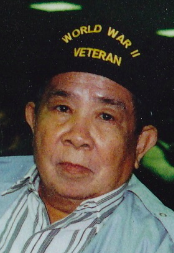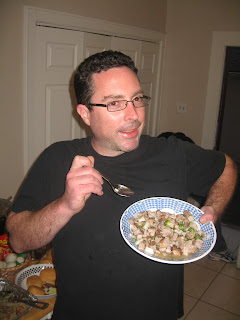My Grandfather's Papers: The Video
 |
Grandpa was a 3LT Signal Officer
when he was captured in the WWII
Death March.
|
My last blog spoke of my dreams to honor my grandfather. Since that blog, I pursued an extensive research process on how to acquire my grandfather's medals. While researching the process online, I came upon the National Archives and Records Administration (NARA). This is where I found a link that allowed me to submit my case. The form I filled out on line had many disclaimers of no guarantee of processing any time soon since NARA sees some 4000 requests at a time.
This was discouraging, but I filled out the form and requested information on how to further send my documentation. After sending the e-mail, I waited a month and did not hear back. In the meantime, I meticulously combed through my grandfather's papers and outlined my case with referencing evidence along a timeline of American history during WWII.
 |
| Me and T2 in DC |
In any case, my follow up letter to NARA revealed "they did not receive the consent from the first request". I had a reference number of the original request and a copy of the e-mailed consent signature from next of kin as the auto-reply requested, but they said they had not received it. So I received an apology, and an invitation to resubmit my consent signature. Requests expire after thirty days. When a new request is logged, a new case number is assigned. This starts a new thirty day interval clock to receive the consent. I wanted to minimize the number of e-mails so I made sure my proof was attached to the second consent signature letter.
During my research, I found the AAPI White House web page contest calling for videos to tell "What's Your Story". I found that this was perfect timing to share the connectedness of the work I was trying to pursue for my grandfather and consequently other veterans.
 |
| The letter awarding my grandfather's medals |
To my surprise, the video placed Top 11 out of 200+ submissions. This was another emotional roller coaster. The final three vidoes were decided by online voting. The last stretch was an experience in itself. I used Facebook and e-mails to request votes. As of now, I have 1,837 views. Although I did not win the final three, I felt I won already because rumor has it, the video made my dad cry. He never cries. I think if I can give him some closure then my true reason for making the video was fulfilled.
I visited DC again, met my new mentor at the airport and told him that I acquired my grandfather's medals. Now I am in a credible position to help others. The next stage is to try to effect change on a national level. He gave me a video to watch, more stories and some guidance. He said he was a military man and a mission, strategy and plan needed to be clear and that it would not be an easy task to organize the Filipinos. In my mind, I think trying to honor the soldiers is going need more than the support of Filipinos. This is not a Filipino issue. This is not a veteran issue. This is an American issue. This is going to need the support of everyone.
Sadly my story is a dime a dozen. Many families do not have closure, some 80,000 soldiers served, died or survived that horrible war. Somewhere under the American flag and in between colonization and Philippine independence these soldiers were forgotten. I have heard a range of stories. Some were highly decorated, some were happy to just survive. Some received no benefits. Some received a pittance of a check after having to prove over twenty years that they survived a great war, regardless of rank.
Wether the reason was racism or lack of paper work, neither is a good excuse. I want to believe the best in people. I think the reason is that some of these soldiers are still alive and it is just too painful to talk about. It is a pity though to wait for them to pass away to hear their story or to find their papers or to honor them. If they are still with us, it is our duty of the next generation to ask the questions and to have the curiosity to find the story that connects us. We will not be complete ourselves unless we know where we come from. We need to get the history accurate in our own minds and in our textbooks.
So, I continue my book and I work to organize a workgroup on an issue I hope is not a lost cause. Frankly, at this moment - the reasons I have seen so far on why these soldiers have not been honored properly by either medals or American history textbooks is unacceptable. If you are willing to join me in any way to tie up lose ends and help give the surviving, the widows and survivors closure, I am going to need all the help I can get.
How to help?
1) Send me your e-mail if you want to join my workgroup at asianamericanoralhistory@gmail.com.
2) If you have a story, I want to know about it. I am also the Filipino liaison for Rice University's Houston Asian American Archives where stories are officially documented.
3) Watch the video on the White House website. It should be up for a while. It is called Asian American Oral History in Texas.
4) Become a follower of this blog.
5) Like "Asian American Oral History" page on Facebook and I will post more ways to support once the workgroup is organized and events are posted.
6) Educate yourself. There is an amazing documentary out now called "Forgotten Soldier" narrated by Lou Diamond Phillips. Like them on Facebook and you can get the latest showtimes and locations.
6) Educate yourself. There is an amazing documentary out now called "Forgotten Soldier" narrated by Lou Diamond Phillips. Like them on Facebook and you can get the latest showtimes and locations.



Comments
Post a Comment